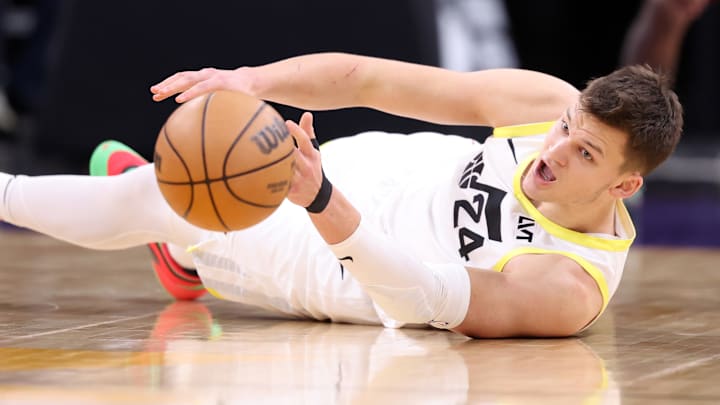It came out yesterday that the Utah Jazz did not agree to a contract extension with Walker Kessler this offseason, paving the way for him to become a restricted free agent next summer. The Jazz have a solid rationale for this - waiting until next summer to pay him also gives them room to spend in free agency. This also explains why Utah sold its veterans at a low price this summer.
The Jazz made it their mission to clean house this summer, with most of their most experienced veterans departing - John Collins, Collin Sexton, and Jordan Clarkson - and the real shocker being the extremely little they received in return, causing controversy for their decisions.
Some of their decisions shocked the masses because in some, they not only received nothing in return, but arguably even negative value. To this day, not many (if any) can make sense of the Sexton for Jusuf Nurkic swap since Sexton is unquestionably the better player, and the Jazz had to give up an additional asset on top of him.
Collins, who was coming off his best season in years, was sold off for very little, while Clarkson was straight-up bought out. Doing so signaled that the Jazz simply wanted to turn their focus to developing their young talent, to which the trio of Sexton, Collins, and Clarkson only got in the way of.
However, Utah could have also traded those three for worse players on worse deals to net more draft assets for their troubles. They had the long-term cap room to do it, and it could have aided their rebuild a tad. Their approach with Kessler may explain why they opted not to.
The Jazz want as much cap flexibility as possible when they re-sign Kessler
By ensuring there were no long-term contracts on their payroll (besides Lauri Markkanen), they will have the cap room to pay Kessler while also maintaining cap flexibility to add an impactful player via free agency.
That's why the Jazz simultaneously wanted to get rid of the veterans on last season's roster while being willing to take back lesser players who wouldn't (or potentially wouldn't) be on the payroll in 2026. Doing so allows them to potentially become a better team faster than many would anticipate.
It's not like what the Jazz did with their veteran trio this summer was an all-around brilliant move. If anything, it puts into question why they acquired them and/or kept them as long as they did. This was more about making the best of a difficult situation.
When, not if, Utah re-signs Kessler next summer, selling off the veterans for the little they did won't be looked back too fondly, but it should still be seen as an all-around necessary move.
